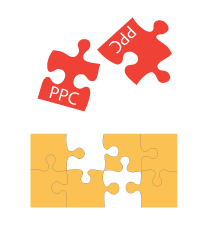PPC is nothing to be afraid of. If you’re tried to run campaigns on your own, certainly it can be a frustrating experience. Most clients come to us after having wasted a coupon or two, and perhaps a few weeks daily spend at £50 per day too, without much to show for it. But don’t despair; Adwords is effective, and could form the mainstay of your business if run correctly.
What exactly is PPC?
Pay Per Click (PPC) advertising is an affordable way for you to get the news about your business out to the public at large. It works through search engines that promote your ad whenever someone searches for products similar to yours. Have a compelling enough ad, and people will check out your website by clicking on the ad next to their search results. You pay when that person clicks through to your site, making it an economical and effective method of advertising. The way to drive traffic to your ads is through the effective use of keywords.
What is a Keyword?
A keyword is, simply put, the key word to describe your business or product. You may have one keyword or many, but the one consistent thing about a keyword is that it is unique to what you are selling. For an example: you sell blue widgets that come in different configurations, but the core product is a blue widget. So your keyword is going to be blue widget. This comes into play with pay per click advertising as well as the regular organic searches. An ad makes your site selling blue widgets that much more visible because you focused on those keywords.
 How do Keywords Work in Pay Per Click?
How do Keywords Work in Pay Per Click?
When you create an ad, you have to write a succinct sentence or two around your product. Distill that further to writing around the specific keyword you have chosen in order to make it more specific.
Another example: you’re selling blue widgets, and you want to catch the attention of people who are looking for them. You write a targeted ad around your blue widget keyword so that it comes up in an ad when someone searches for a blue widget. You can write anything you want in that ad as long as it is relevant to the blue widget wording. Writing disjointed ad copy only serves to make it more difficult for you to get customers to click through to your site, and may be punished by the search engine as well.
What if There is a lot of Competition for My Keywords?
Sometimes it so happens that you’re selling something that a lot of other people are, and you have to up your game in order to get ahead of them. When this happens, it’s time for keyword research.
There are many “tools” out there that help you find related keywords to your core keywords. Adding these keywords to the core help you grab a wider audience for your product, thus increasing the possibility for sales.
Research to see which keywords are used a lot or not much at all. The more a keyword is searched for, the harder it is to rank for it. However, it’s not impossible, provided you have good content to go with your core keywords.
Write a Compelling Ad for Your Product
Now that you’ve gotten all of the keywords and related keywords identified, it’s time to write your ads. Always remember that quality is key. That is, don’t write spam or uneducated-looking content; viewers pick up on this and get a negative impression. If you have to, hire someone to write the ads.
Remember that a search engine ad is a lot like writing a Tweet. It has to be quick, short and to the point. Take your keywords and write around them while incorporating them smoothly into the text. A well-written, short but succinct ad draws in more eyes than not.
Related articles

